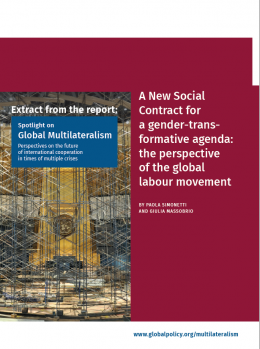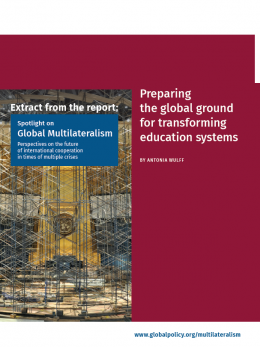
A New Social Contract for a gender-transformative agenda: the perspective of the global labour movement
By Paola Simonetti and Giulia Massobrio
The world is facing a convergence of interconnected global crises that are taking a devastating toll on people and the planet and turning decent work into an illusion for the majority of workers. Faced with such a context, the ITUC calls for a renewed multilateralism to support a New Social Contract based on six key demands: 1) the creation of decent and climate-friendly jobs with just transitions; 2) rights for all workers; 3) minimum living wages and equal pay; 4) universal social protection; 5) equality; and 6) inclusion. The workers’ call for a New Social Contract is making its way into key global policy discussions, such as the UN Secretary-General’s “Our Common Agenda” proposals and the UN Global Accelerator on Jobs and Social Protection for Just Transitions. Still, in order to achieve the 2030 Agenda, national governments urgently need to step up their commitments and work together with social partners to build transparent, inclusive and gender-transformative multilateral frameworks under the UN leadership.

Preparing the global ground for transforming education systems
By Antonia Wulff
With the launch of the UN Secretary-General’s report Our Common Agenda in September 2021 came a long overdue and somewhat unexpected endorsement of education as one of the big global issues. The COVID-19 pandemic had a disastrous impact on and in education systems, hitting already underfunded and overburdened public systems, and affecting millions of already marginalized children, young people and communities. In response, the UN Secretary-General convened the first-ever summit at the level of Heads of State devoted to education. The aim was to get the world back on track towards the goal of quality education for all but also to jumpstart the necessary transformation of education systems. The summit fell short of expectations but did provide an opening to address some systemic challenges. The question now is what happens next, and whether the global governance of the education sector and the multilateral system more broadly can address the changes required of governments and of the International Financial Institutions (IFIs).
